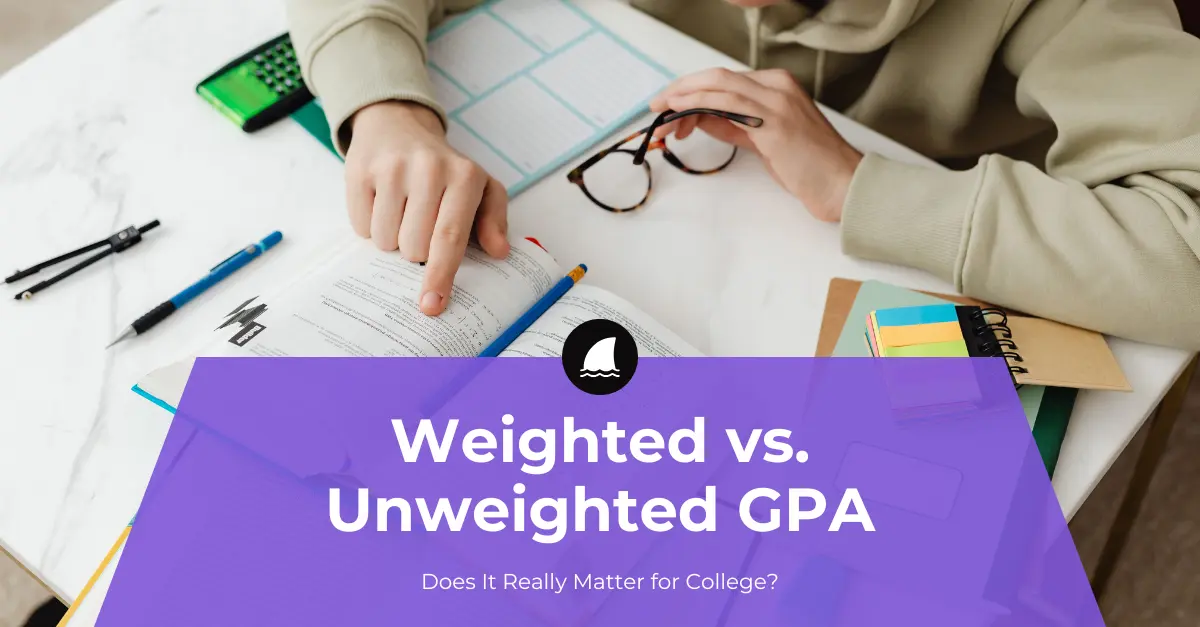
One of the issues students face today is the question of GPA. Many learners question why they need it, what it means to colleges, and how to calculate it in order to get ready for the application.
Well, there are so many questions, and the answers are pretty simple. In this article, we will dive into the issue of GPA and compare weighted GPA vs unweighted GPA. Moreover, we will discuss the benefits and limitations of both alternatives and understand which of them colleges need today. So, if you want to get answers to your questions concerning GPA, know how to calculate it, and learn how to improve your application chances if your GPA is not very high, this piece is just for you.
Your GPA is your Grade Point Average. This is a number that represents your overall academic progress in high school. In simpler words, this is a summary of all the grades you’ve earned, turned into a scale that colleges can quickly understand. As a result, a higher GPA shows stronger academic achievement, while a lower one shows that you have experienced some challenges along your academic path.
Today, most colleges use GPA as a first impression. Usually, each grade gets a numerical value, and then all the numbers are added together and divided by the number of grades. As a result, your GPA is the numerical average of your performance in all your courses.
When it comes to college admissions decisions, GPA plays a central role. It gives colleges an easy way to compare students from different schools and backgrounds. A strong weighted GPA or an unweighted one is usually a sign of your ability to handle challenging coursework, stay disciplined, and perform well over time, and these are the qualities that the predominant part of colleges value in prospective students. During your academic years, you work on various assignments, essays, and other tasks your professors provide and get grades that then shape your final score for the course and impact your GPA in the end.
Today, you can use various GPA calculation tools that can help you rate your college essay and predict the score it might get. For many students, this is a great helper that makes their academic performances much easier. So, if you need help assessing your writing, do not neglect this opportunity.
You should remember that GPA alone won’t secure your admission. Colleges also consider standardized test scores, extracurricular activities, recommendation letters, personal essays, and even a review from your school counselor to get the full picture of your personality and academic abilities. Thus, a college application essay writer is another helpful tool that most college applicants turn to when they want to get a place at an institution. As you can see, GPA is an important piece of the puzzle, but it’s far from the only one that affects your academic application.
Well, what is unweighted GPA, and what is a good unweighted GPA? These are the most common questions, with an additional one being what the main characteristics of an unweighted GPA are. Let’s dive a bit deeper into these questions. Simply put, it uses a standard 4.0 scale and treats all classes equally. Whether you take a regular class or an honors class, an “A” will always count as a 4.0.
If you have been looking for an explanation of how to calculate unweighted GPA, here is how to use the unweighted GPA scale:
Each grade you earn is converted into a point value. “A” equals 4.0, “B” equals 3.0, “C” equals 2.0, “D” equals 1.0, and “F” equals 0.0. All your grades are added together and divided by the number of classes taken. The result is your cumulative unweighted GPA.
Let’s look at an example of how to calculate your high school GPA:
What is your unweighted GPA? Let’s say you took five classes this semester:
Now, let’s count!
Step 1: Convert your grades to points and add them together: 4.0 + 3.0 + 4.0 + 2.0 + 3.0 = 16.0
Step 2: Divide by the number of classes: 16.0 ÷ 5 = 3.2 GPA
In this case, your cumulative GPA is 3.2.
There are several types of GPA, but let’s look at the pros of an unweighted GPA.
Of course, an unweighted GPA has its limitations, and here are some of the most important ones.
Now, what is weighted GPA? The weighted GPA system recognizes the difficulty of the classes you take. Compared to an unweighted GPA, a weighted GPA can sometimes go higher, even up to 5.0 or beyond, depending on the scale your school uses. But whats a good weighted GPA? In short, a weighted GPA rewards not just the grades you earn, but also the difficulty of the classes involved.
Well, the weighted GPA calculation process is similar to the one for the unweighted GPA, but in this case, advanced classes carry more weight. For example, while an “A” in a regular class is worth 4.0, an “A” in an honors class might be 4.5, and an “A” in one of the AP courses might be 5.0. Finally, as with an unweighted GPA, after assigning point values, you add them together and divide by the number of classes, and that is your GPA.
Let’s discuss the example below:
Suppose you took five classes:
Let’s count:
Step 1: Convert the grades to weighted points and total them: 4.0 + 3.5 + 5.0 + 2.0 + 3.5 = 18.0
Step 2: Divide by the number of classes: 18.0 ÷ 5 = 3.6 overall GPA
So, your weighted GPA is 3.6, which is higher than the 3.2 unweighted GPA you would have earned with the same grades.
Well, what are the advantages of a weighted GPA?
Still, there are some disadvantages that you should be aware of.
We’ve already discussed the weighted and unweighted GPA, and this brief table can help you see the differences gathered in one place.
We have compared weighted vs unweighted GPA, but for students who are going to apply to colleges, there still can be a lot of questions like “Do colleges look at weighted GPA?” or “What colleges pay attention to unweighted GPA?” When it comes to admissions, most colleges don’t rely solely on the GPA printed on your high school transcript.
Oftentimes, institutions recalculate GPA using their own formula to make fair comparisons between applicants from different schools. They often consider credit hours and many other factors. This means your weighted or unweighted number is only the starting point, and college admissions officers will dig deeper to understand the full story behind it.
Well, there is no single answer to the question of whether colleges prefer weighted GPA or unweighted GPA. One of the first things they examine is course difficulty. Colleges want to know whether you challenged yourself with honors, AP, or IB classes rather than just sticking to easier courses. Just as important are your grade trends; this can make a stronger impression than a perfect but flat record. Admissions committees also consider the context of your school, recognizing that grading scales, course offerings, and academic opportunities vary widely from place to place.
In the end, while GPA is a crucial measure of academic performance, it is never the only factor in admissions decisions. Of course, a strong GPA opens doors, but it’s your entire application that truly defines your chances. Thus, you should pay close attention to all the steps you will take when applying to a college, and you can even make use of a college essay review to make sure you have performed effectively.
As you can see, your GPA is an important part of your college application. Still, it’s not the only piece that will define your future because there are a lot of other factors that admissions committees consider when assessing your candidacy. Even if your class grades are average or lower than you’d like, you still have plenty of opportunities to stand out from the crowd. College admissions usually look at your entire story, not just one number, so if you are worried about your GPA, let’s see how you can maximize your chances.
Having a strong GPA gives you a clear competitive edge. This will show the committee that you’ve consistently excelled in academics. Still, admissions may want more than just numbers. A powerful essay that reflects your personality, goals, and values can help distinguish you from other high achievers.
If your course grades are solid but not extraordinary, don’t panic — we are sure you can shine in other areas. Look for strong letter grades, show meaningful extracurricular activities, and write a compelling essay; these will be the proof of your academic skills that grades alone can’t capture. Also, do not forget to highlight your leadership or unique experiences in your application essay to make yourself memorable.
Of course, for the predominant part of colleges, a lower GPA shows that there were challenges a learner could not handle effectively, but a low student's GPA on its own is not a verdict, and it doesn’t close the door on college opportunities. Your essays and personal story become critical here. Use them to explain your growth, your resilience, or the unique hardships you’ve overcome, as well as emphasizing your drive, your potential, and what you’ll contribute to the college community in question.
If you feel that your writing is not that strong, you can always turn to academic advisors for college application essay editing and ask them to polish your piece to perfection. These professional editors usually know pretty well what admissions committees are looking for, and they know how to help you shine even with a lower grade point average.
While GPA is an important measure of a student's academic performance, it isn’t the whole story. Colleges want to see the person behind the numbers, and a strong application essay can be just as impactful as a high GPA. Your grades show what you’ve accomplished, but your essay reveals who you are, what you care about, and how you’ll contribute to a given college community. Even if your GPA isn’t perfect, a compelling essay paired with your other strengths can make your application shine.
In this article, we have discussed the difference between weighted and unweighted GPA and paid a great deal of attention to the question of which of these types of GPA is more important for the colleges and universities you want to apply to. Also, we have discussed how to handle calculating GPA if you have little to no experience with it.
Your GPA shows your grades. Your essay shows your story. Make sure it stands out — get expert editing today.
Ivy League schools review both weighted or unweighted GPAs, but still, they focus more on course difficulty level, grade trends, and context. Weighted GPA can highlight rigorous coursework, but you can still show your strongest sides via your essay.
Yes! Weighted GPAs can even exceed 4.0 because advanced classes like honors, AP, and IB courses carry extra points. Therefore, this type of GPA reflects both your academic achievement and the rigor of your coursework.
You can compare your GPA with the average GPA of students admitted to your target college. Consider your school’s grading system, its courses’ level of difficulty, and how your GPA meets program expectations.
Taking challenging courses can boost a weighted GPA and demonstrate academic ambition, but balance is essential. It is more effective to prioritize classes you can excel in without risking your overall performance.




